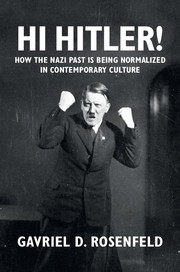Book contents
- Frontmatter
- Contents
- List of Figures
- Acknowledgments
- Introduction
- 1 A “good war” no more: The new World War II revisionism
- 2 From history to memory and back again: Debating the Holocaust’s uniqueness
- 3 Probing the limits of speculation: Counterfactualism and the Holocaust
- 4 Nazis that never were: new alternate histories of the Third Reich
- 5 Humanizing Hitler: the Führer in contemporary film
- 6 Between tragedy and farce: Nazism on the Internet
- Conclusion
- Notes
- Bibliography
- Index
4 - Nazis that never were: new alternate histories of the Third Reich
Published online by Cambridge University Press: 05 December 2014
- Frontmatter
- Contents
- List of Figures
- Acknowledgments
- Introduction
- 1 A “good war” no more: The new World War II revisionism
- 2 From history to memory and back again: Debating the Holocaust’s uniqueness
- 3 Probing the limits of speculation: Counterfactualism and the Holocaust
- 4 Nazis that never were: new alternate histories of the Third Reich
- 5 Humanizing Hitler: the Führer in contemporary film
- 6 Between tragedy and farce: Nazism on the Internet
- Conclusion
- Notes
- Bibliography
- Index
Summary
‘There’s something wrong.’
They were walking down 25 Mai Strasse. On either side of them was Belgian artillery: captured guns displayed on low plinths.
‘You just figured that out?’ said Patrick.
‘I mean about this place.’
The last time they’d been here was in September 1944, during Operation Sisal, and those final days before the Afrika Korps’s assault on the city. With the Belgian administration in chaos and unable to evacuate its citizens, the job fell to mercenaries. The streets thronged with people desperate to escape, but only those with enough ‘portable’ – gold, jewels – had been saved. Everyone else was left to their fate. Burton felt a stirring of long-suppressed guilt. He could still remember them, the sweat, the panic, wide eyes set in beseeching faces …
‘There are no blacks.’
‘Say what?’ said Patrick.
‘Look at the faces.’
Apart from the heat, the palms, and baobab trees, they might have been in Hamburg.
British writer Guy Saville’s ominous portrayal of Nazi-ruled Stanleystadt, the new capital of the former Belgian Congo, in his recent novel, The Afrika Reich (2011), highlights the enduring appeal of imagining how the history of Nazi Germany might have turned out differently. In the half-century after World War II, scores of alternate histories were produced on the subject of Nazism. The appearance of new accounts since the turn of the millennium once more confirms that “what if?” questions about the Third Reich continue to spark the imagination of writers, scholars, and filmmakers throughout the Western world. Recent alternate histories have appeared in many countries – the United States, Great Britain, and Germany, in particular – and have assumed a variety of forms, including novels, short stories, historical essays, films, television programs, and comic books. They have also tackled a variety of counterfactual questions: what if the Nazis had won World War II? What if Hitler had been assassinated? What if the Führer had survived the war? What if the Holocaust had never happened?
- Type
- Chapter
- Information
- Hi Hitler!How the Nazi Past is Being Normalized in Contemporary Culture, pp. 158 - 233Publisher: Cambridge University PressPrint publication year: 2014



